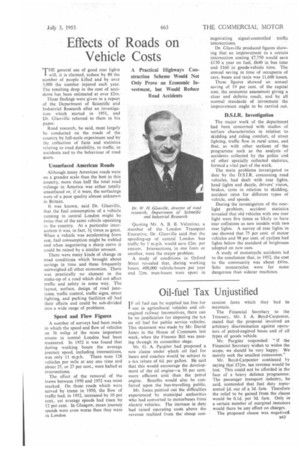Oil-fuel Tax Unjustified
Page 101

If you've noticed an error in this article please click here to report it so we can fix it.
F oil fuel can be supplied tax free for I use in agricultural vehicles and oilengined railway locomotives, there can be no justification for imposing the tax on oil fuel for public service vehicles. This statement was made by Mr. David Jones in the House of Commons last week, when the Finance Bill was passing through its committee stage.
Mr. G. A. Pargiter had proposed a new clause under which oil fuel for buses and coaches would be subject to a tax rebate of 6d. per gallon. He said that this would encourage the development of the oil engine—a 50 per cent. more efficient unit than the petrol engine. Benefits would also be conferred upon the bus-travelling public.
Mr. Jones pointed out the difficulties experienced by municipal authorities who had converted to motorbuses from electric vehicles. The increase in duty had raised operating costs above the revenue realized from the cheap con
cession fares which they had to maintain.
The Financial Secretary to the Treasury, Mr. J. A. Boyd-Carpenter, stated that the proposal involved an arbitrary discrimination against operators of petrol-engined buses and of all types of goods vehicle.
Mr. Pargiter responded: "If the Financial Secretary wishes to widen the scope, we should be very happy. We merely seek the smallest concession."
Mr. Boyd-Carpenter continued by saying that £5lm. tax revenue would be lost. This could not be afforded in the face of a heavy defence programme. The passenger transport industry, he said, contended that fuel duty represented Id. out of a 3d. fare. Therefore the relief to bc gained from the clause would be 0.1d. per 3d. fare. Only in a certain number of marginal instances would there be any effect on charges.
The proposed clause was negatived.




























































































































































